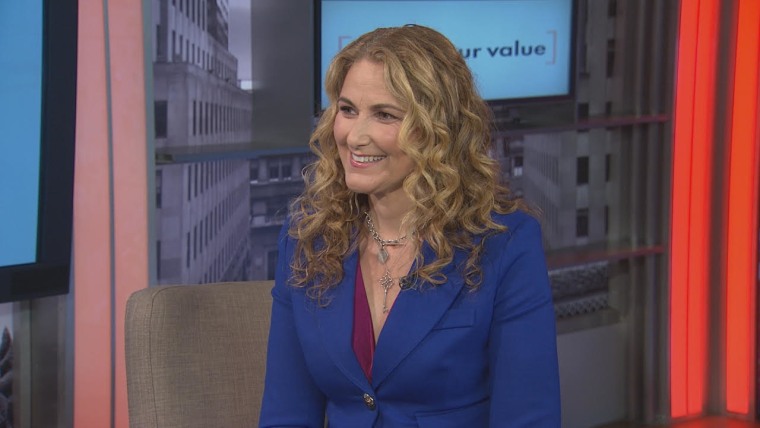Dr. Jennifer Gunter is separating myth from medicine.
In an interview with NBC’s Joelle Garguilo, the OB-GYN — known for debunking health myths perpetuated by the media or celebrities — spoke to Know Your Value about the misinformation plaguing women’s health.
She also noted that many women cannot say the word “vagina” comfortably.
“It’s so common to see women who go to their doctor who can’t say the word,” said Dr. Gunter, who has a web series, blog, and New York Times column. “You should be empowered to ask questions, and your doctor should be able to answer your questions. If they can’t answer your questions respectfully, they have a problem. It’s not you. You deserve to have information.”
Dr. Gunter recently wrote a book called “The Vagina Bible: The Vulva and the Vagina - Separating the Myth from the Medicine” to combat the onslaught of misinformation and discrimination against women in the medical profession.
RELATED: 5 top fertility myths debunked by Dr. Jennifer Dr. Gunter
“We must expect medicine and doctors to do better, to take women’s concerns seriously,” Dr. Gunter said. “...Give women information so that they know if their concerns are valid or not.”
Dr. Gunter offered the following tips and warnings for women who are seeking medical information.

1. Start with medical societies.
Everybody Googles health information, said Dr. Gunter. The best way to ensure that you’re getting real information on the internet is to start with medical society webpages, like The American College of Obstetricians and Gynecologists, or the Society of Gynecologic Oncology.
“If you start your search in a professional society, you can get a lot of accurate information about that subject initially,” said Dr. Gunter. “You don’t want your first information to come from a place that’s say, anti-vaccine... You want to start with vetted information from experts that’s done in an unbiased way. That’s what medical societies do.”
2. Ditch the common myths.
The uterus is not full of toxins, according to Dr. Gunter, and the vagina isn’t an inherently dirty organ. These are common myths perpetuated by the patriarchy, she argues.
“[The vagina] is a self-cleaning oven. Douches are like cigarettes for the vagina ... and you hear about menstrual blood being dirty, so you’ve got offshoots like vaginal steaming and lots of bloggers who talk about toxins. This has been used from multiple cultures, to exclude women from going to school.”
Women have also been told to change their vaginal smell by eating certain foods, said Dr. Gunter.
“That myth is so pervasive. It’s rooted in the patriarchy that somehow your normal vagina doesn’t smell great. You can’t change the smell of your vagina with food because there’s no connection with your vagina and your gut. The way your vagina smells has everything to do with the good bacteria in your gut.
3. Be cautious of the “wellness” industry.
“Wellness” is a $4 trillion-a-year industry that sells supplements, powders, creams, pills and more products across digital influencer platforms. Dr. Gunter warned that the wellness industry is vulnerable to predators looking to scam people, and that many wellness products are not vetted by science.
“Wellness isn’t science. I want people to have facts about their bodies. Wellness is trends,” said Dr. Gunter. “Health isn’t a trend. Science takes years and years and years to come up with answers. It can’t be that for these three months it’s gonna be turmeric, for the next three months it’s gonna be charcoal. That’s impossible. Studies can’t do that. So what we have to do is close these gaps so predators aren’t using them.”
4. Say the words, and ask the questions.
If women want to receive diligent care, they should get comfortable saying the words “vagina,” “vulva,” “clitoris,” or any of these important terms that have been deemed dirty.
“It’s a pretty effective tool of the patriarchy to have an organ that we cannot talk about," said Dr. Gunter. “If you want to oppress half of the population, you make their body parts dirty or unclean ... You see women who say vagina when they mean vulva, and we’re not talking about the clitoris or all those things that are super important.”
5. Advocate for yourself.
Women are often dismissed for overreacting to their medical symptoms, according to Dr. Gunter. She recalled being told she was “hysterical” when she was suffering from postpartum sepsis after the birth of her triplets. Unfortunately, women have to fight to get the care they need.
“If you feel really ill and you are not being listened to, you need to advocate for yourself as best as you can,” said Dr. Gunter. “Don’t leave. Insist on seeing another doctor. Bring another family member to advocate for you ... How women are being dismissed is almost criminal to me. That means we’re not educating our healthcare providers, or they’re not listening.”
